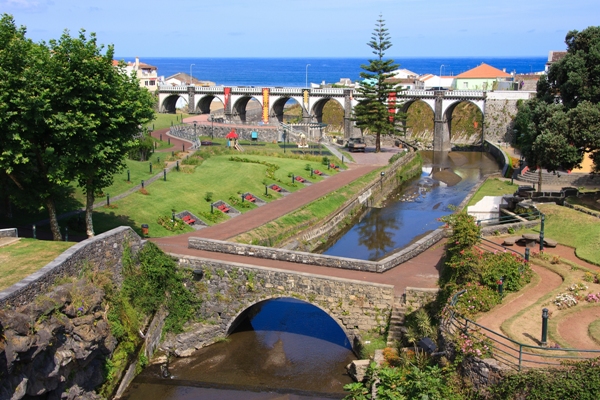Life on most small islands is governed greatly by the weather. Farmers and fishermen live and work according to the seasons, while the cultural aspects of island life (such as festivals and celebrations) are often centred around the annual changes in the local weather.
The Azores are no exception and while the overall climate on these mid-Atlantic islands is relatively steady throughout the year, the weather systems that influence the islands are anything but predictable.
Azores High
You may hear the weather forecasters on British TV talking about the Azores High, and how it might affect our weather in the near future. The Azores High is an area of high pressure which, for most of the year, sends winds in a clockwise directions around the Azores. The system picks up warm air from the tropical regions to the south of the Azores and carries it northwards. When the Azores High moves northwards towards the UK in the summer months it pushes our weather systems north, often bringing us warm, settled weather. In the winter when the High moves south, it allows colder air to push down over much of Europe.
For most of the year, the Azores High sits close to the islands and ensures that the climate is relatively mild. Summers are warm but rarely hot (typically temperatures in July and August are around 23 degrees) while even in the middle of winter the daytime highs are usually in the mid-teens. Rain can appear at any time of the year, but clouds typically pass quickly and on a drive across an islands it’s not unusual to pass through a shower and emerge into sunshine within a couple of minutes. Prevailing weather comes from the west, and it is the westernmost islands of Flores and Corvo which see more rainfall than the islands to the east.
While the Azores will never rival the Canary Islands as a beach destination, the water temperature in winter is similar to that off the British coast in the summer months, so a swim in the sea is not restricted to the brave and foolish.
Planning around the Azores weather
As a visitor, the weather does play a major part in what you can and can’t do during your visit. For whale-watching trips it is the summer months which offer the calmest conditions in which to set out. Inter-island boat transfers also depend on the weather and sea travel in the winter months is unpredictable. The islands are well known for their floral displays and these too are at their most impressive in the summer months. But while summer has its obvious advantages, the spring is a great time to see the fresh blooms without the crowds. And the winter festivals around Christmas offer a far less commercialised (and much warmer!) alternative to the northern European Christmas markets.





